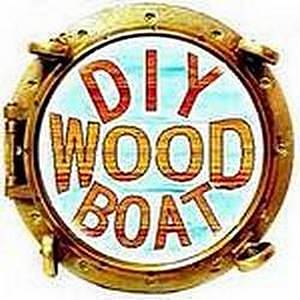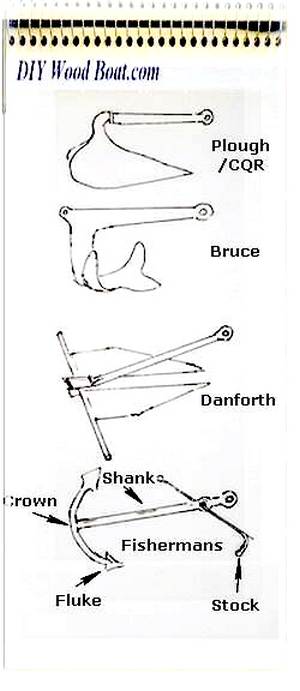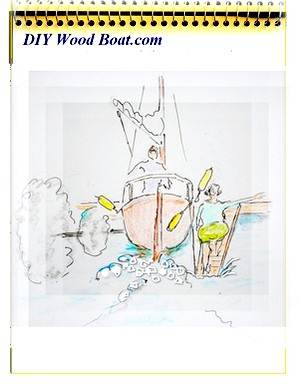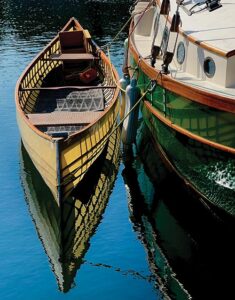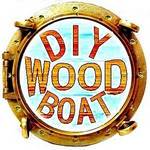- Home
- Begin Boating
- Life Jackets
- Trailers
- PM 38 Club
- Anchoring
- Etiquette
Boating Etiquette
Minding your Maritime Manners
Boating etiquette is all about being a good neighbour and minding your manners when afloat.
However,
there are certain customs and traditions that, while some have a safety
aspect, are really about keeping our increasingly crowded waterways
pleasant and friendly.
Just as there are social norms you're expected to know on land, you should be aware of the basic rules of boating etiquette.
Old hands can sometimes be quick to judge newcomers who unwittingly transgress.
Don’t be judged.
There is nothing difficult or arcane about these customs.
They are simple traditions that help to keep our increasingly crowded waterways pleasant and friendly for everyone.
Everyone should also be acquainted with the COLREGS, flag etiquette and radio procedures.
Marina Manners

Sailboat
owners should remember to tie back running rigging, there is nothing
worse than lying awake listening to other boat's halyards Frapping in
the breeze.
Don't hog any temporary loading or fuelling slips, others may be
waiting to use them.
Never discharge your waste in a harbour or a marina.
Coil your ropes, cords and hoses and don't have them cross the dock,
they are serious tripping hazards, particularly at night.
Don't stow your gear on the dock, it's just another hazard for others to contend with, that's if it doesn't disappear.

Don't
moor with your bow, anchor or bowsprit extending across the dock
Don't leave food or garbage out in your cockpit or on the dock.
Always ask permission before boarding another boat.
If
you are going to raft up, communicate in advance with the other boats
to see who is going to be involved and in what order.
When boats are rafted, cross over via the bows to get to the
dock. It
is bad etiquette to cross over boats through the cockpit.
Shut off electronics cell phone when not in use and when you leave your vessel.

Don't use your barbecue in the marina.
DO clean up after your dog.
Lend a hand. be willing to assist other vessels as they arrive and depart
If you've used a piece of equipment intended for common use, put it back where you found it.
When you are walking along a dock, don't peer into other's boats.
Keep the noise down.
Prepare lines and fenders before entering harbour and leave them on the deck until you near the dock.
Ramp etiquette
A good day on the water, can be spoilt by a lack of good boat
ramp etiquette.
When launching, prepare and load your boat in the parking lot or an out of the way place.
Take off covers, tie-down straps (except bow strap), install electronics etc and load up with anything you're planning to take along.
When it's your turn to launch, do it as quickly and comfortably as you
can.
Once the vessel is afloat and clear of the trailer move her aside, away
from the launching side of the dock and then move your vehicle of the
ramp, park well clear in an area where you are not blocking
traffic.
You should observe the same etiquette when you return to the ramp to
retrieve your boat.
Tie up to a temporary dock or to the side of the ramp while you
discharge passengers and return with your tow vehicle.
Don't waste time on the ramp draining or cleaning.
Try not to have others waiting on you unnecessarily, it works both ways.
Underway
Always treat other boaters with consideration while underway.
Power boaters must be aware of the affect their wake can have on
smaller boats and sailing vessels, slow down and be sure to give them a
wide berth.
When boating near sailing vessels, it is etiquette to reduce speed to minimize your wake and always pass to their stern and or their leeward sides.
Sailing vessels should never interfere with a power vessel just to exert its right of way.
Slow down if another boat is trying to overtake you.
When overtaking a slower vessel in open water, do so with as much room as depth and conditions will allow and slow your speed, if necessary, to minimise your wake.
It is good manners to make sure you get permission before picking up a guest mooring.
Anchoring
 Anchoring Etiquette
Anchoring EtiquetteMost people looks
for privacy when they anchor, respect the privacy of your neighbours in
the anchorage.
Always enter an anchorage or mooring area at a slow speed so as
minimise any wake.
Etiquette and tradition dictates that the first boat in to an anchorage sets the precedent, eg scope and swinging radius etc.
But not at the cost of
trying to hog the anchorage by laying out too much scope.
Subsequent arrivals should attempt to match these configurations.
However, if they do not have enough scope out it might be prudent for
you to go elsewhere.
Don't anchor too close or directly upwind of another boat, always allow
room for the vessels to swing.
Develop an anchoring system and a set of hand signals to communicate
with one another to avoid the embarrassing shouting.
If you have a noisy crew, children, pets or if you intend to light a
barbecue or use a generator on board anchor downwind of your neighbours.
Frapping halyards, my pet hate, tie them back.
Dinghy etiquette, dictates driving slowly through the anchorage without
creating a wake.
If you are using your dinghy at night to go to shore or visit others in
the anchorage, do so under oars rather than using your outboard.
And when ashore, try your dinghy painter under any painters that may
already be on the bollard or cleat
If you need to use a spotlight make sure you don't inadvertently blind
your neighbour or shine it into other people's boats.
Don't empty your heads or bilges in small coves or jettison rubbish,
including biodegradables.
The etiquette for approaching another vessel is do so on their
starboard side, six to ten feet away and call out, "Ahoy, vessels
name".
Never ever go knocking on the windows except in an emergency.
It is courteous to request permission to tie up and come aboard.
There is nothing wrong with letting people know that something they are doing is bothering you.




